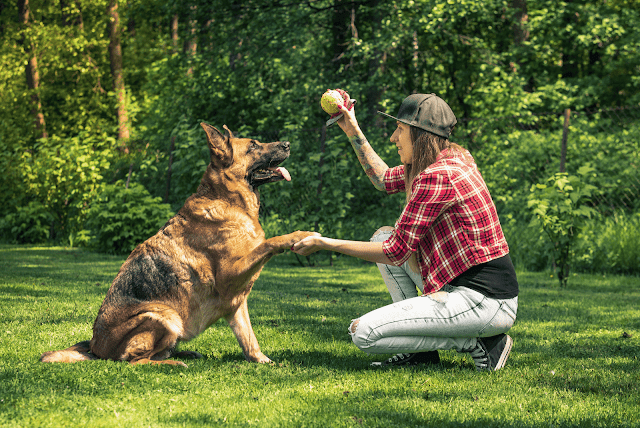German Shepherd Dog: A Versatile and Noble Breed
The German Shepherd Dog, known for its courage, confidence, and intelligence, is widely regarded as one of dogkind's finest all-purpose workers. This large and agile breed exhibits a noble character and an unwavering loyalty that makes it a favorite among dog lovers. In this article, we will explore the characteristics, history, and care requirements of the German Shepherd Dog.
Breed Traits and Characteristics
The German Shepherd Dog is a muscular and well-proportioned breed that can stand as high as 26 inches at the shoulder. Its appearance is defined by smooth, graceful curves, giving it an elegant outline. The natural gait of a German Shepherd Dog is a free-and-easy trot, which can be elevated to impressive speeds when necessary.
While their physical attributes are remarkable, it is the German Shepherd's character that truly sets it apart. Known for their loyalty, courage, and confidence, German Shepherds possess a remarkable ability to learn and execute commands for various tasks. They are willing to put their lives on the line to defend their loved ones.
German Shepherds make excellent family pets, displaying gentleness and devotion to their families. However, there is a certain aloofness about them that may prevent them from forming immediate and indiscriminate friendships. This breed's reserved nature is part of its distinctive charm.
Size and Life Expectancy
The German Shepherd Dog comes in different sizes, with males typically measuring between 24 and 26 inches in height and weighing between 65 and 90 pounds. Females are slightly smaller, standing at 22 to 24 inches and weighing between 50 and 70 pounds. On average, German Shepherds have a life expectancy of 7 to 10 years.
History and Recognition
The German Shepherd Dog has a rich history that dates backto the late 19th century. Captain Max von Stephanitz, a German cavalry officer, played a crucial role in shaping and standardizing the breed we know today. He sought to create a versatile working dog that excelled in herding tasks and possessed an impeccable character.
In 1908, the German Shepherd Dog was officially recognized as a breed by the American Kennel Club (AKC). Since then, it has enjoyed considerable popularity and currently ranks as the 4th most popular breed according to AKC's rankings.
Care and Responsibilities
Owning a German Shepherd Dog is both a privilege and a responsibility. As a responsible owner, it is essential to provide them with proper care, attention, and training. Here are some key aspects of German Shepherd Dog care:
Health
Maintaining the health of your German Shepherd is of utmost importance. Regular veterinary check-ups, vaccinations, and preventive measures against common health issues are crucial. German Shepherds may be prone to certain conditions such as hip dysplasia, elbow dysplasia, and degenerative myelopathy. Being proactive in their healthcare can help ensure they lead a healthy and happy life.
Grooming
The German Shepherd's coat is double-layered and requires regular grooming. Weekly brushing helps keep their fur clean and minimizes shedding. During shedding seasons, more frequent brushing may be necessary to manage the amount of loose hair. Additionally, regular dental care, ear cleaning, and nail trimming are essential parts of their grooming routine.
Exercise
German Shepherds are an active and energetic breed that thrives on physical activity. Providing them with regular exercise is vital for their well-being and mental stimulation. Daily walks, interactive play sessions, and opportunities for them to stretch their legs and run are necessary to prevent boredom and promote a healthy lifestyle.
Training and Socialization
German Shepherds are highly intelligent and trainable dogs. They excel in obedience training and can be taught a wide range of commands and tasks. Early socialization is crucial to ensure they grow up to be well-adjusted and confident dogs. Exposing them to various people, animals, and environments at a young age will help them develop into balanced and well-mannered companions.
Nutrition
Feeding your German Shepherd a balanced and nutritious diet is vital for their overall health. Consult with your veterinarian to determine the appropriate diet based on their age, size, activity level, and any specific dietary requirements. High-quality dog food that provides the necessary nutrients will support their growth, maintain a healthy weight, and keep their coat shiny.
Finding a German Shepherd Dog
If you're considering adding a German Shepherd Dog to your family, it's important to find a reputable breeder or consider adopting from a rescue organization. The American German Shepherd Rescue Association and the German Shepherd Dog Club of America can provide valuable resources and connections to help you find your perfect companion.
The German Shepherd Dog's versatile nature, unwavering loyalty, and exceptional intelligence make it a breed that stands out among its canine counterparts. Whether serving as a working dog, a loyal family companion, or excelling in various dog sports, the German Shepherd continues to impress with its remarkable character and abilities. By providing them with the care, training, and love they deserve, you can experience the joy and fulfillment of owning a German Shepherd Dog.
*Note: This article is for informational purposes only and should not be considered as professional veterinary or medical advice. Always consult with a qualified veterinarian for specific concerns or questions regarding your German Shepherd Dog's health and well-being.*

